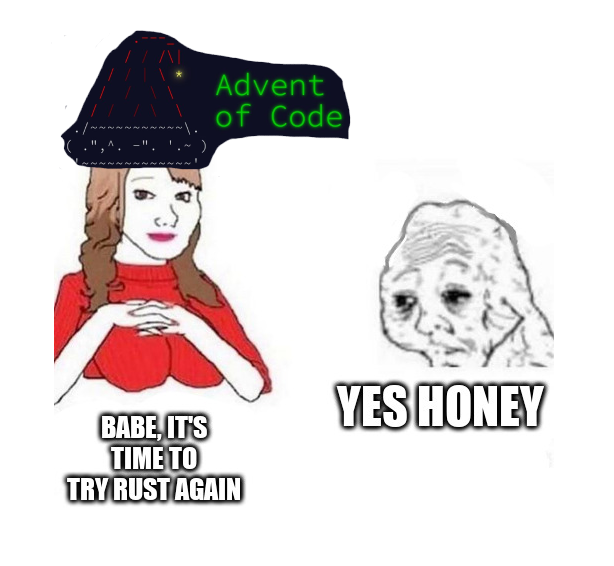It’s not my first choice, but it’s gonna be TypeScript for me. I’ve got an interview for a primarily TS position coming up this week so would like to brush up on its quirks.
If the interview doesn’t go well, then I’ll probably switch to Go, though hehe. I’ve been really enjoying using it, but no one’s ever paid me to do so.
I’ve got a really nice setup with benchmarks, auto-input-fetching and solution upload and such, written in Rust, so I’m sticking with that. I kinda wanted to try Odin, but december really snuck up on me, and I didn’t have time to set it up or really get familiar with it.
Iterators and slicing and such are all just… so nice for parsing streams.
I’ve solved the first two in Rust, and will likely keep going until I can’t anymore, just like with previous years. It’s a fun language, and i’d love some practice too
I’ve tried using vyxal 3, and while I was able to solve day1 part 1, part 2 still eludes me. I know what I have to do but I haven’t been able to coax the language into doing what I want it to, probably because it’s a wholly different paradigm from praclangs.
Nix, because I hate myself. No, it is very much not made for this purpose. But it’s possible to use if for this.
I’ve seen a couple people attempt this. Am very curious about how exactly that will be done. Although I’ll have to say that i’ve seen far worse and/or more difficult submissions. People cook up absolutely insane code
True. I love how AoC is a hotbed for creative and/or insane ways of solving coding problems.
If you wanna check out how it goes in Nix: https://git.sr.ht/~kintrix/aoc2024
I’ve started with Go, but I think I’ve realised AoC isn’t for me. I feel so incredibly dense.
That’s fair if you aren’t having fun, but I wouldn’t write it off completely. Like I only made it to day four last time.
The problems they present are of a totally different class to what most programmers will ever encounter in the “real world.”
Once you get more used to the style of the problems (data structures and algorithms (DSA), like what you might see on leetcode), then you honestly start to have fun with them.
I really struggled with DSA until recently, so if you’d like some help I would be happy to give you some pointers.
Thanks. I felt very deflated after struggling with something seemingly so simple. I was using Go and couldn’t figure out part 2, at least without nesting loops three layers deep.
Today I decided to try to learn Elixir instead and allowed myself some assistance from Claude.ai, which was much more fun.
Nesting loops is indeed the first intuition anyone would have to that problem. The only reason I knew to use a hashmap data structures is because I practiced on exactly these kinds of problems, and looked up explanations and answers on the most basic stuff imaginable.
I felt very deflated after struggling with something seemingly so simple.
Definitely not simple. Especially without training in DSA. You shouldn’t expect yourself to spontaneously invent efficient algorithms to problems that have been stumping students for decades.
Try it out yourself for maybe 30 minutes, then do yourself a favour and look up a good explanation to solving it.
My hope for this year is that we can help eachother understand and solve these problems. I’d love to find some good “editorials” on each problem, breaking them down in detail.
Yes, I guess I held myself to too high expectations. I haven’t even studied CS and learned programming on my own… I’ve been trying to do some exercises and a few courses on algorithms but of course that can’t be compared to going to university. Thanks for the tip, I won’t spend hours in frustration in the coming days for sure. Maybe I should post my attempts even though they are incomplete or fail, to spark discussion.
I would love to see some attempts and discuss alternatives, improvements, etc
After solving puzzles and seeing other peoples’ elegant solutions while mine feels brutish and ugly (even if our approaches use the same algorithm, mine is inevitably less elegantly-implemented), I also feel too stupid for AoC sometimes.
But hey, I am never going to get less stupid if I don’t try, and solving problems the ugly way is still a solution. I have fun doing it.
But if it’s not just the comparison to others ruining your fun, if it’s that you inherently do not find this activity enjoyable, don’t force yourself!
Typescript with Deno. Was thinking of trying Gleam but I don’t know if I’d have the time to do it in a new language and Deno is just so nice anyway lol
I’ve enjoyed Deno in the past. Similarly, I’ve heard good things about Bun, though haven’t used it myself.
J, because I’ve wanted to learn it for a long time. It scratches kind of the same itch as my old HP 48 calculator, actually, although that was much closer to Forth than APL. Both of them are mind-bendingly terse and not great at expressing things other than raw mathematics.
Have you had a good look at Factor? FWIW I’ve got at least the first 3 days with it up here.
I’ve been reading your solutions! I have not spent any time with Factor at all, but the solutions you’ve put up look very nice and clean.
Golang, just for learning a new language. But I’m a bit time constrained so I don’t expect I’ll be able to complete every day.
Going with rust for the second year, I’m still trying to learn things with it and AoC is a great way to do so

R, because I’ve already used Python, VBA, and Excel formulas.
My „comfort language“ Kotlin and Python, because I really got to refamiliarize myself with that language. I probably won‘t have the time to do much more than that, but if I do, I‘d love to try to solve the problems with a Minecraft datapack.
Still going with C as my main language with the ‘straight to the point’, data and array centric style that’s worked well before. Perhaps see if I can get some of it running on Turbo C again. Also fiddling around with JavaScript now for list comprehension variants and was eyeing Elixir but that’s probably not happening this year.
Julia, since I used it for some projects this year but never for something “time critical” like AoC with a new problem each day. I really like that it’s simple like python but with strong typing. Originally I wanted to use Ocaml to learn it, but on day 1 I realised I don’t know how to do anything in it yet 😄.
Factor!







